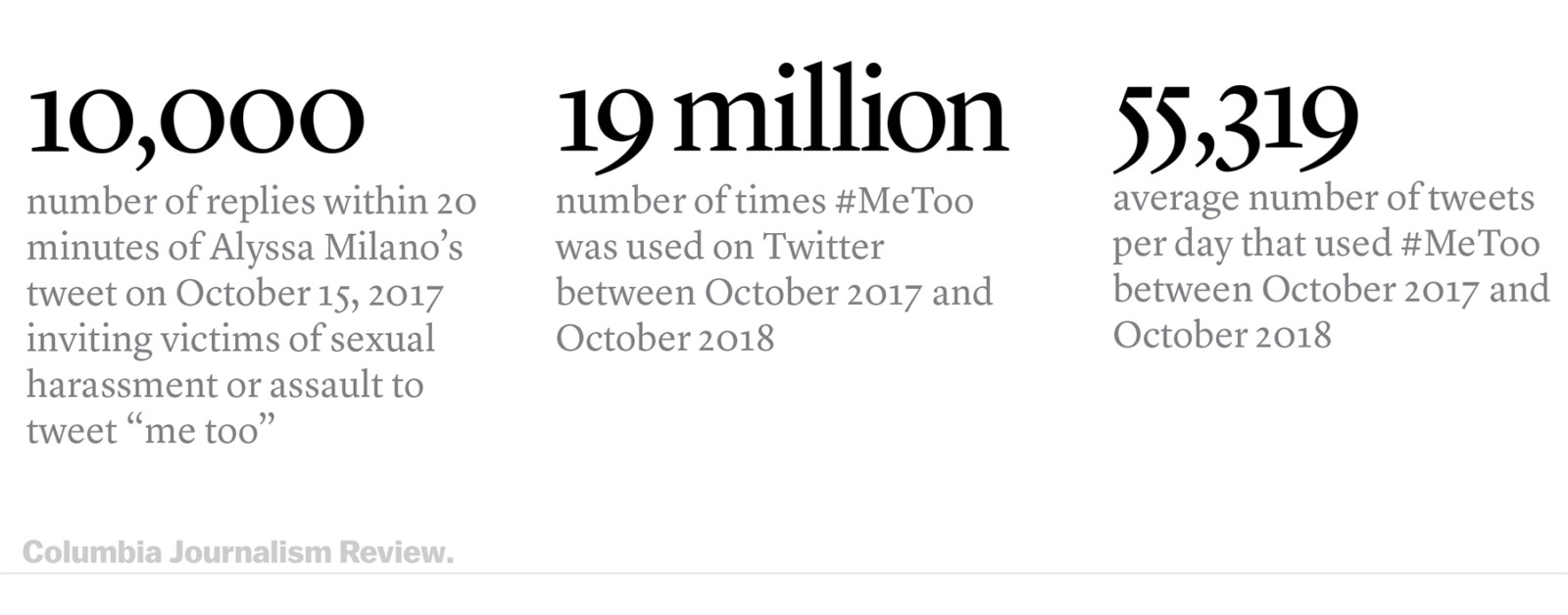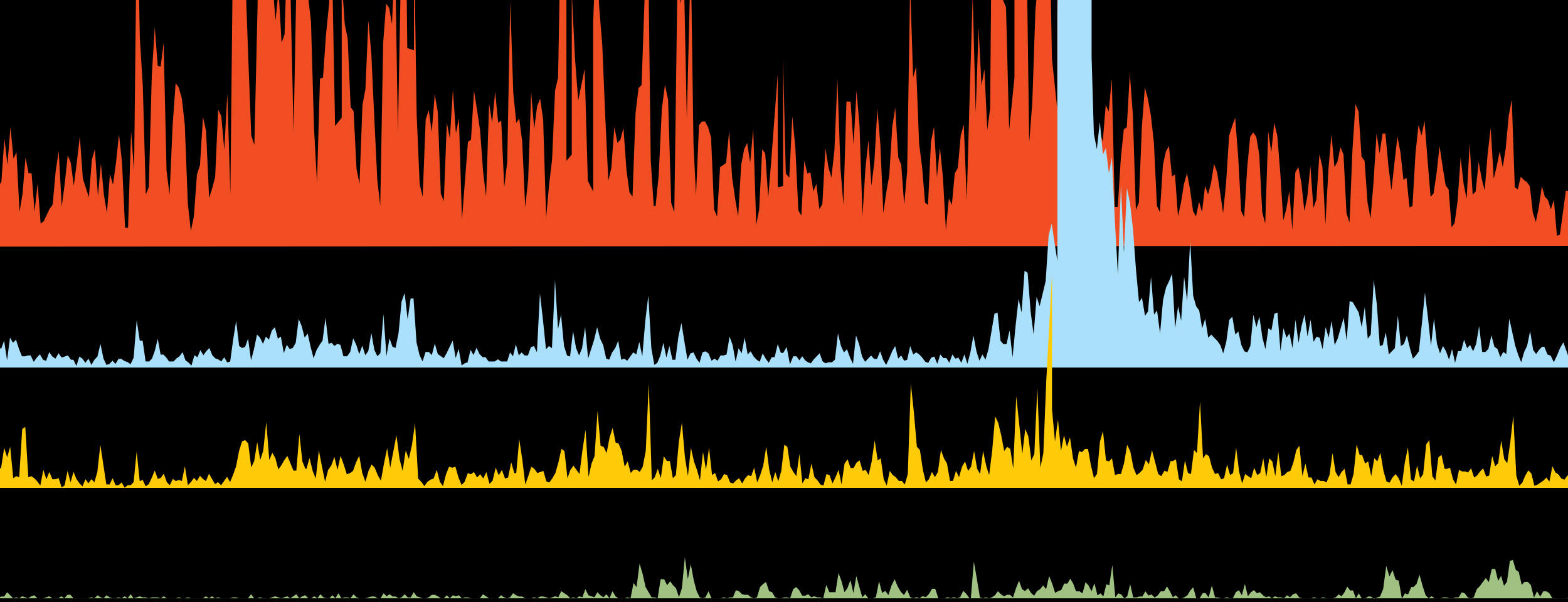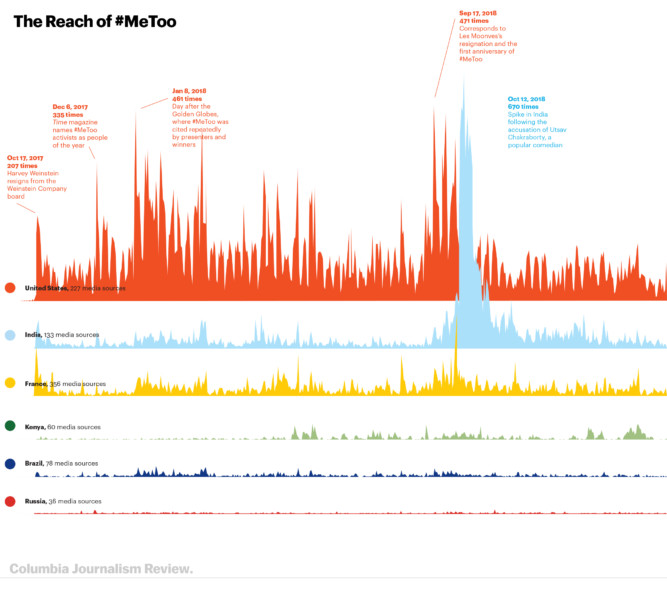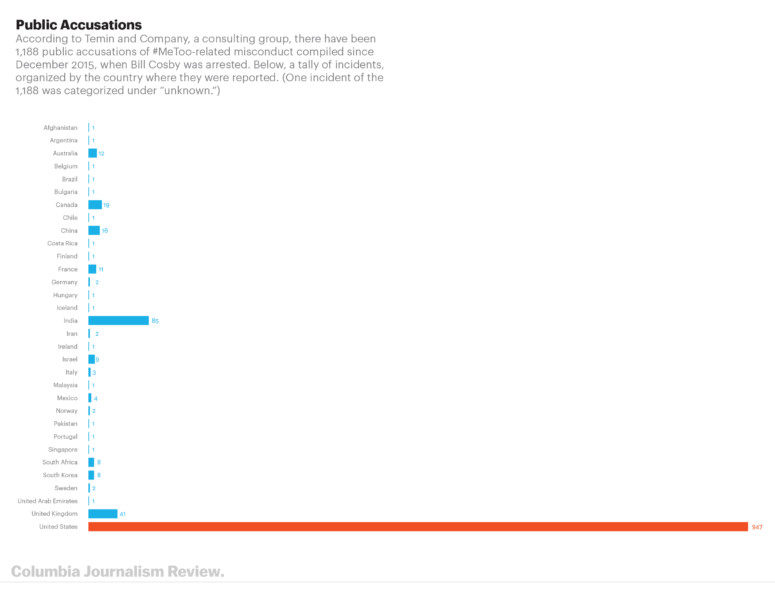The #MeToo movement began in the United States with a hashtag coined by Tarana Burke, and it has become a global phenomenon. Using the open-source tool Media Cloud, we looked at how many times #MeToo was mentioned in news articles published around the world between October 1, 2017 and April 1, 2019.
Breakthrough Moments
China In January 2018, Chen Xiaowu, a professor at Beihang University, was accused of sexually harassing Luo Xixi, a student. Luo shared her story on Weibo, and Chen was fired.
Costa Rica Óscar Arias Sánchez, the former president and Nobel Peace Prize laureate, was accused of rape by Alexandra Arce von Herold, a psychiatrist and activist, and of sexual assault by at least eight other women. The allegations were reported in February 2019 on the personal website of Amelia Rueda, a journalist.
India Utsav Chakraborty, a comedian, was accused by several women and a 17-year-old girl of sending unsolicited pictures of his genitals. The accusations were first posted on Twitter in October 2018.
South Korea In 2018, Seo Ji-hyun, a lawyer, went on JTBC News to speak about a senior male colleague groping her at a funeral eight years prior. She filed a formal complaint with her firm, she said, but her career subsequently suffered.
Sweden In December 2017, Aftonbladet Daily ran sexual harassment and abuse allegations from 40 unnamed women against Benny Fredriksson, CEO of the Stockholm City Theatre. Fredriksson committed suicide the following March, and the story’s reporting methods came under scrutiny.
United Kingdom In October 2017, researchers at Westminster released a spreadsheet that accused 37 Tory MPs, male and female, of unverified sexual misconduct toward junior staff. Two parliament members left the cabinet.
France There have been successes: a government minister of gender equality instituted fines of up to 750 euros for street harassment, and members of “La Ligue du LOL,” an online group of male journalists that led harassment campaigns against women, were outed. But public opinion has been mixed. In 2018, an open letter denouncing the #MeToo movement as excessive finger-pointing was signed by more than 100 women, including Catherine Deneuve.
Kenya Although tech company Ushahidi was hit with allegations in July 2017, the #MeToo movement failed to build on that momentum or to grow beyond the country’s relatively new tech industry.
Russia The Russian legal system offers no definition or framework for dealing with complaints of sexual harassment. Russians often ridicule allegations of sexual harassment as no more than political correctness, and President Vladimir Putin suggested that the #MeToo movement is a “media conspiracy.” In February 2018, several female journalists accused Leonid Slutsky, the head of the foreign affairs committee in the Duma—Russia’s lower house of parliament—of sexual harassment. An ethics commission quickly cleared Slutsky. More than a dozen news organizations withdrew their correspondents from the Duma.
South Africa South African women considered #MeToo an American movement of limited use; there was already a vocabulary and a set of homegrown tactics in place for addressing sexual harassment.

Lingua Franca
The variety of local hashtags demonstrates the global scope of the #MeToo conversation.
Arabic #أنا_كمان
Argentina #MiraComoNosPonemos (look at what you’ve done to us)
Brazil #PrimeiroAssedio (first harassment)
Canada #MoiAussi
China #米兔 (rice bunny; phonetically “mi tu”)
Finland #MeMyös
France #BalanceTonPorc (squeal on your pig)
Israel גםאנחנו#
Iran من_هم_همینطور#
Italy #QuellaVoltaChe (that time when)
Japan #私も
Mexico #MeTooEscritoresMexicanos (#MeTooMexicanWriters)
North Macedonia #СегаКажувам (I speak up now)
Norway #stilleføropptak (silent until recorded)
Pakistan میں_بھی#
Philippines #BabaeAko (I am woman)
Russia #МеняТоже
Senegal #Nopiwouma (I will not be silent)
South Korea #나도당했다
Spain #YoTambién
Sweden #TystIKlassen
Thailand #DontTellMeHowtoDress
Vietnam #TôiCũngVậy
The Editors are the staffers of the Columbia Journalism Review.




